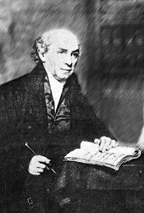Carey, William

Carey, William (1761-1834) scholar, linguist, missionary, was born in the north of England and had a humble beginning. He first earned his living as a shoemaker. But he was too gifted intellectually to keep contented with the world he encountered. Carey had keen aptitude for general learning, especially for acquiring knowledge of foreign languages. He learnt a number of languages including English, Latin and Hebrew. He also acquired elementary knowledge about botany, horticulture, zoology and geography.
In 1789, Carey left shoe making for becoming a Baptist missionary. When he came to know about the 'heathens', he published a book on how to 'emancipate' them from 'eternal fire', and subsequently he arrived in Bengal accompanied by his family and another Baptist missionary, named John Thomas, who had previously lived in Bengal.'
Carey arrived in Kolkata in November 1793, and almost immediately started learning Bangla. He engaged ramram basu as his teacher. With his help, Carey later started to translate the bible into Bangla. Steeped in extreme hardship, Carey was forced to take a job at an indigo plantation in north Bengal.
At the end of 1799, two other Baptist missionaries, Joshua Marshman and William Ward, arrived in Kolkata, but were obliged to take shelter in the Danish Settlement of Xerampore, as organised preaching Christianity was not permitted by the east india company for political reasons until mid-nineteenth century. Carey joined them in Serampore in January 1800 and established the serampore mission and more significantly its press, which later earned the reputation of becoming the first printing press in Asia. By the middle of the year, he published his Bangla translation of the Gospel of Mathew.
Carey was appointed as the head of the' department of Bengali at the fort william college on 4 May, 1801.
With the help of native scholars, Carey soon produced some Bengali textbooks for classroom purpose. Apart from the works of ramram basu and mrityunjay vidyalankar, with whom he published three more books in the first two years, Carey alone compiled and published a grammar of Bangla language and a book of model conversations in Bangla in different social settings. He later compiled a Bengali-English Dictionary and a history book called Itihasmala (1812). The textbooks written under his guidance set a model of, and a standard for formal Bangla prose, which was at that time in its infant stage. More importantly, Carey organised and encouraged native scholars to write different kinds of textbooks, not only in Bangla, but also in some other Indian languages. He himself learnt quite a number of other Indian languages and with the help of his colleagues, wrote grammars of some of those languages and translated the Bible into those languages. He also compiled a polyglot dictionary of thirteen Indian languages. That itself shows his linguistic ability and great energy and scholarship.
In addition to his activities at the Fort William College, Carey was also involved in the development of agriculture and horticulture in Bengal. He established the 'Agri-horticultural' Society of Bengal in 1823 and in 1824 he was elected the president of that society. He edited and published two monumental works by William Roxburgh entitled Hortus Bengalensis '(1814) and Flora Indica (1832). 'He was also involved in the activities of the Textbook Society and helped distribute textbooks for schools. He urged the government to abolish the inhuman infanticide and sati systems. Various societies such as Royal Agricultural Society and Royal Geological Society honoured him for his contributions to oriental learning. He died on 9 June in 1834. [Ghulam Murshid]
Bibliography D Kopf, British Orientalism and the Bengal Renaissance, California U. P., Berkeley, 1968; D Potts, British Baptist Missionaries in India 1793-1837: The History of Serampore and its Missions, University Press, Cambridge,1967; G Smith, Life of William Carey, Shoe-maker and Missionary, Murray, London 1887.
